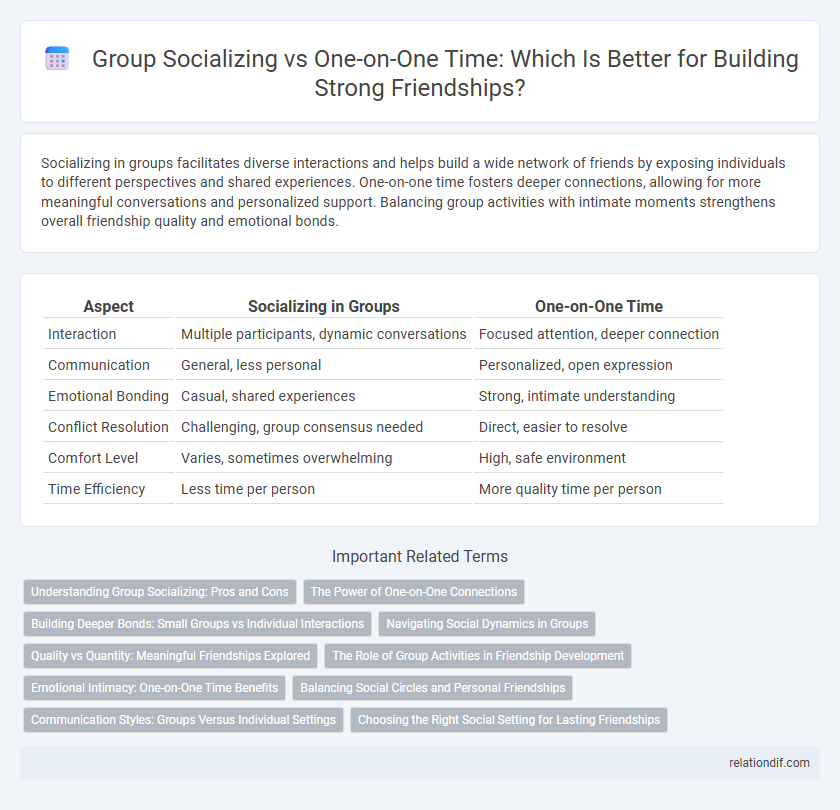Socializing in groups facilitates diverse interactions and helps build a wide network of friends by exposing individuals to different perspectives and shared experiences. One-on-one time fosters deeper connections, allowing for more meaningful conversations and personalized support. Balancing group activities with intimate moments strengthens overall friendship quality and emotional bonds.
Table of Comparison
| Aspect | Socializing in Groups | One-on-One Time |
|---|---|---|
| Interaction | Multiple participants, dynamic conversations | Focused attention, deeper connection |
| Communication | General, less personal | Personalized, open expression |
| Emotional Bonding | Casual, shared experiences | Strong, intimate understanding |
| Conflict Resolution | Challenging, group consensus needed | Direct, easier to resolve |
| Comfort Level | Varies, sometimes overwhelming | High, safe environment |
| Time Efficiency | Less time per person | More quality time per person |
Understanding Group Socializing: Pros and Cons
Group socializing fosters diverse interactions and enhances communication skills by exposing individuals to various perspectives and social dynamics. However, it may lead to superficial connections and decreased opportunity for deep, meaningful conversations that one-on-one time provides. Balancing group activities with intimate interactions is crucial for developing both broad social networks and strong personal bonds.
The Power of One-on-One Connections
One-on-one connections foster deeper emotional intimacy and trust compared to group socializing, allowing individuals to share personal experiences and thoughts more openly. These focused interactions enhance empathy and strengthen bonds by reducing distractions and social pressures typical in group settings. Research indicates that meaningful one-on-one time significantly boosts relationship satisfaction and mental well-being.
Building Deeper Bonds: Small Groups vs Individual Interactions
Socializing in small groups fosters a dynamic environment where diverse perspectives enhance communication skills and create a sense of belonging. One-on-one interactions allow for more intimate conversations, promoting trust and emotional vulnerability that deepen individual bonds. Balancing group activities with private moments optimizes relationship quality and personal connection in friendships.
Navigating Social Dynamics in Groups
Navigating social dynamics in groups requires active listening and attentiveness to nonverbal cues, which help in understanding varying personalities and potential conflicts. Effective socializing involves balancing inclusivity while allowing space for individual contributions, enhancing group cohesion. Mastering these skills fosters deeper connections and trust among friends beyond one-on-one interactions.
Quality vs Quantity: Meaningful Friendships Explored
Meaningful friendships thrive on quality interactions rather than the sheer quantity of social engagements. One-on-one time fosters deeper emotional connections and trust, while group socializing enhances a sense of belonging and broadens social networks. Prioritizing intimate exchanges over frequent, surface-level interactions leads to stronger, more fulfilling relationships.
The Role of Group Activities in Friendship Development
Group activities foster diverse social skills by exposing individuals to varied perspectives and collaborative problem-solving scenarios, crucial for deepening friendships. Environments such as team sports, clubs, or group projects encourage trust-building, empathy, and shared goals, accelerating interpersonal bonding beyond casual acquaintance. Engaging in collective experiences creates a rich groundwork for sustained friendships by emphasizing communication, cooperation, and mutual support.
Emotional Intimacy: One-on-One Time Benefits
One-on-one time fosters deeper emotional intimacy by allowing individuals to share personal thoughts and feelings without distractions common in group settings. This focused interaction strengthens trust and understanding, creating a safe space for vulnerability. Emotional bonds formed in one-on-one socializing tend to be more meaningful and enduring compared to group interactions.
Balancing Social Circles and Personal Friendships
Balancing social circles and personal friendships requires navigating the dynamics of group interactions and one-on-one connections, where group settings foster a sense of community and shared experiences, while individual time deepens emotional bonds and trust. Prioritizing both environments enhances social fulfillment by addressing diverse social needs, supporting mental well-being, and strengthening relational intimacy. Effective balance is achieved by allocating time strategically to nurture broad networks and meaningful personal relationships.
Communication Styles: Groups Versus Individual Settings
Communication styles differ significantly between group socializing and one-on-one interactions, impacting friendship dynamics and emotional intimacy. In group settings, communication tends to be more dynamic and less personal, often emphasizing humor, shared interests, and social cues to maintain group cohesion. One-on-one interactions allow for deeper, more meaningful conversations where nonverbal cues and active listening play crucial roles in strengthening trust and understanding.
Choosing the Right Social Setting for Lasting Friendships
Choosing the right social setting plays a crucial role in building lasting friendships, as group socializing promotes diverse interactions and shared experiences that strengthen bonds. One-on-one time, on the other hand, fosters deeper emotional connections, trust, and understanding between individuals. Balancing group activities with intimate conversations ensures meaningful relationships that endure over time.
Socializing in groups vs One-on-one time Infographic

 relationdif.com
relationdif.com